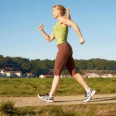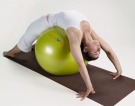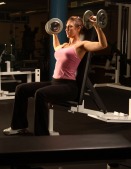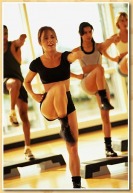FITNESS GURU
The benefits of physical exercise are so great that even just a little boosts your HDL cholesterol, which is also referred to often as the good cholesterol.
In addition, another of the benefits of physical exercise is that it also helps the circulatory system do its job better while lowering blood fats and blood pressure. One of the greatest of the benefits of physical exercise is the effectiveness it has on reducing the risk for heart attack, stroke and heart disease.
The benefits of physical exercise go well beyond the heart. The benefits of physical exercise also include strengthening muscles, increasing flexibility and strengthening bones. This helps prevent osteoporosis, which is a disorder that causes thinning of the bones.
Physical Exercise can Help with Stress and Anxiety
The benefits of physical exercise on a regular basis also include an impact on mental health benefits as well, such as anxiety and stress relief. It promotes more quality sleep, which effectively increases energy.
Practically anyone can take advantage of the benefits of physical exercise. However, year after year, research indicates that the majority of people are simply not active enough. Hundreds of thousands of people are dying every year because they do not take advantage of the benefits of physical exercise on a regular basis.
With all of the major advances in technology, more and more new devices are being created on an almost daily basis that are designed to reduce manual effort. It comes as no surprise that physical activity is so limited.
In addition, many people are under the impression that taking advantage of the benefits of physical exercise must be strenuous and difficult to really be effective.
However, the truth is that simple physical activities, such as working in your garden, provide positive health effects.
Physical Exercise Can Help You Maintain a Healthy Body Weight
Taking advantage of the benefits of physical exercise is a healthy and fun way to manage weight control. By burning off more calories than you take in, you will be able to lose extra pounds and maintain a healthy body weight.
In fact, you only have to burn three thousand five hundred calories to lose one pound. The more strenuous the physical activity, the faster you will burn off the calories.
However, you can burn the same amount of calories with a lower impact activity, if you practice it more often with longer sessions than a higher impact activity. Either way, the benefits of physical exercise are substantial.
The benefits of physical exercise include several body trimming effects. It displaces fat and helps build muscles. By building muscle through taking advantage of the benefits of physical exercise, you will be more successful with your diet plan.
When you reduce your caloric intake, your metabolism slows down and does not burn off the calories as quickly. This is why several people cut back on the calories, but still do not lose weight. One of the benefits of physical exercise is that it helps build muscles that continue to burn calories even when you are not exercising, which keeps the body's metabolism working hard at a steady pace.
Read more about benefits of physical exercise by 24 Hr Fitness
The Health Benefits of Physical Exercise
Read more about benefits of physical exercise by 24 Hr Fitness
THE HEALTH BENEFITS OF EXERCISE
Click to set custom HTML
The Elements of Fitness
Fitness is defined as "the ability to carry out daily tasks with vigor and alertness, without undue fatigue, and with ample energy to enjoy leisure time pursuits and to meet unforeseen emergencies." Yet physical fitness means different things to a dancer, marathon runner, lumberjack, mailman, and weight lifter. It's also a relative term, in that you may be fitter than you were last year or than your neighbor, but there's no clear-cut point at which you are "fit". One fact is clear, though: if fitness is the goal, exercise is the way to get there.
There are four basic elements of physical fitness: cardiovascular endurance, muscular strength, muscular endurance, and flexibility. Each can be measurably improved with regular exercise. But keep in mind that exercising to build fitness is not the same thing as working out to improve athletic performance. To be truly fit, you should develop all four elements, not just one or two.
While each element is a part of being fit, the most vital is cardiovascular endurance. Physiologically, cardiovascular endurance is the sustained ability of the heart, blood vessels, and blood to carry oxygen to the cells, the ability of the cells to process oxygen, and the ability of the blood, once again, to carry away waste products. Since every cell in the body requires oxygen to function, there is no more basic element of fitness than this - to see that the heart, lungs, and circulatory system do their job.
Cardiovascular endurance is built up through exercises that enhance the body's ability to deliver even larger amounts of oxygen to working muscles. To achieve this, the exercise must utilize the large muscle groups (such as those in the legs) and, most importantly, it must be sustained. With regular aerobic exercise, your heart will eventually be able to pump more blood and thus deliver more oxygen with greater efficiency. Moreover, your muscles will develop a greater capacity to use this oxygen. This is part of what is called the aerobic "training effect." Because your heart is stronger, it can pump more blood per beat, and as a result your heart rate, both at rest and during exertions, will decrease. Your heart will also acquire the ability to recover from the stress of exercise more quickly.





